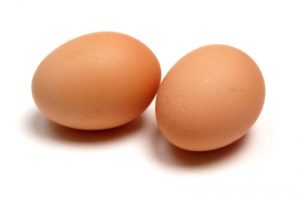 Choline appears to be a neglected nutrient. It is essential for healthy brain functioning, yet researchers of a recent study say the great majority of us do not get the recommended daily intake of choline in our diet. They suggest that this could be causing harm to our health, including the brain.
Choline appears to be a neglected nutrient. It is essential for healthy brain functioning, yet researchers of a recent study say the great majority of us do not get the recommended daily intake of choline in our diet. They suggest that this could be causing harm to our health, including the brain.
They also pointed out that since eggs and meat are the best dietary source, people on restricted or vegan diets are especially at risk of a choline deficiency. It is not found in most multivitamins.
The Arizona State Univ. researchers found that choline deficiency is involved with multiple health problems throughout the body (e.g., inflammation, insulin production, cardiovascular disease, brain function) and even Alzheimer's disease. Their study was conducted on mice, but they felt similar processes occurred in humans.
Good dietary sources of choline: eggs, meat, dairy products, poultry, and fish. Lower amounts are in nuts, beans, potatoes, and cruciferous vegetables (e.g., broccoli).
Related to all this is that one should also try to lower intake of anti-cholinergic medications, if possible. Studies find that their use is linked to cognitive decline and dementia - they block the action of the brain neurotransmitter acetylcholine (which is produced by choline).
Excerpts from Science Daily: Study explores effects of dietary choline deficiency on neurologic and system-wide health
Choline, an essential nutrient produced in small amounts in the liver and found in foods including eggs, broccoli, beans, meat and poultry, is a vital ingredient for human health. A new study explores deficiency in dietary choline adversely affects the body and may be a missing piece in the puzzle of Alzheimer's disease.
It's estimated that more than 90% of Americans are not meeting the recommended daily intake of choline. The current research, conducted in mice, suggests that dietary choline deficiency can have profound negative effects on the heart, liver and other organs.
Lack of adequate choline is also linked with profound changes in the brain associated with Alzheimer's disease. These include pathologies implicated in the development of two classic hallmarks of the illness, amyloid plaques, which aggregate in the intercellular spaces between neurons, and tau tangles, which condense within the bodies of neurons.
The new research, led by scientists at Arizona State University, describes pathologies in normal mice deprived of dietary choline as well as choline deficient transgenic mice, which already exhibit symptoms associated with the disease. In both cases, dietary choline deficiency results in liver damage, enlargement of the heart and neurologic alterations in the AD mice typically accompanying Alzheimer's disease, including increased levels of plaque-forming amyloid-beta protein and disease-linked alterations in tau protein.
Further, the study illustrates that choline deficiency in mice causes significant weight gain, and alterations in glucose metabolism, (which are tied to conditions such as diabetes), and deficits in motor skills.
In the case of humans, "it's a twofold problem," according to Ramon Velazquez, senior author of the study and Assistant professor with the ASU-Banner Neurodegenerative Disease Research Center. "First, people don't reach the adequate daily intake of choline established by the Institute of Medicine in 1998. And secondly, there is vast literature showing that the recommended daily intake amounts are not optimal for brain-related functions."
Ramon Velazquez led the new study on the importance of dietary choline for the brain and other organs. He is a researcher in the ASU-Banner Neurodegereative Disease Research Center.
The research highlights a constellation of physical and neurological changes linked to choline deficiency. Sufficient choline in the diet reduces levels of the amino acid homocysteine, which has been recognized as a neurotoxin contributing to neurodegeneration and is important for mediating functions such as learning and memory, through the production of acetylcholine.
The growing awareness of choline's importance should encourage all adults to ensure proper choline intake. This is particularly true for those on plant-based diets, which may be low in naturally occurring choline, given that foods high in choline are eggs, meats, and poultry.
Plant-based, choline-rich foods, including soybeans, Brussel sprouts and toast can help boost choline in these cases. Further, inexpensive, over-the-counter choline supplements are encouraged to ensure system-wide health and guard the brain from the effects of neurodegeneration.
Choline is needed to produce acetylcholine, a neurotransmitter that plays an essential role in memory, muscle control and mood. Choline also builds cell membranes and helps regulate gene expression. The established recommendations set forth by the Institute of Medicine were based on evidence preventing fatty liver disease in men.
"This collaborative work, spanning multiple institutions and surveying the molecular processes of aging at the systems level, adds to the body of evidence produced around the importance of dietary choline in healthy aging," said Nikhil Dave. "What I found particularly compelling about this project was that multiple organs, whose malfunction can have implications for brain health, were negatively impacted by a choline deficient diet," said Jessica Judd.
